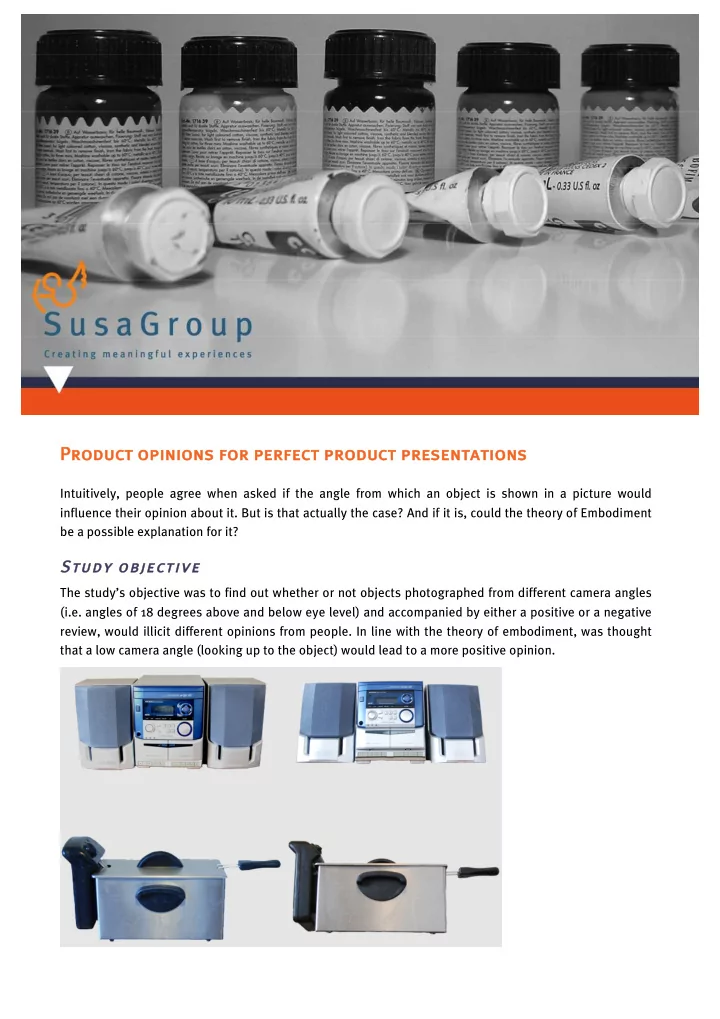

Produc Pro duct opi pini nions ns for r pe perf rfect pro produc duct pre prese sent ntat ations ns Intuitively, people agree when asked if the angle from which an object is shown in a picture would influence their opinion about it. But is that actually the case? And if it is, could the theory of Embodiment be a possible explanation for it? St Study udy obj object ective ve The study’s objective was to find out whether or not objects photographed from different camera angles (i.e. angles of 18 degrees above and below eye level) and accompanied by either a positive or a negative review, would illicit different opinions from people. In line with the theory of embodiment, was thought that a low camera angle (looking up to the object) would lead to a more positive opinion.
St Study udy desi design gn A 2x2 within subjects design was used, with camera angle (high, low) and message (positive, negative) being the independent variables. Dependant variable were the scores on the PrEmo. 86 participants (18 male, 68 female) successfully completed the experiment. The average age was 22.5 (SD= 6.1). The majority of the participants was Dutch or German and all of them were fluent or well-versed in the Dutch language. Photographs of 2 different objects, (a frying pan and a mini stereo set), each from 2 different camera angles (high, low) were used as stimuli. High and low camera angles differ by 18 degrees from the eye level position. This angle makes for a strong camera angle and is chosen to be sure that the effect of camera angles is clearly visible. Each photograph had the original background removed and replaced by a neutral gray background. Accompanying the photographs was a review text, as may be found on a consumer review website or magazine, although they were specifically made either very negative or very positive. Re Resul sults s A multivariate analysis of co-variance (MANCOVA) of the data showed no evidence to support any kind of effect of camera angle on the PrEmo scores . However, the review as well as the “product opinion” co-variable where participants were asked to rate the object with a mark from 1-10, did influence the PrEmo scores. The product opinion has a significant effect on the PrEmo scores for positive emotions, with significances between .000 and .003, with the exception of Fascination. In addition, the product opinion also has a significant effect on Boredom in the negative scale of PrEmo scores, with a significance of .003.
The review also seems to have a significant effect on the majority of the positive emotions, with significances between .000 and .001. Exceptions here are the emotions Hope and Fascination, with significances of .043 and .023, respectively. Contrary to the product opinion however, the review also seems to have an effect on the negative emotions, most notable on Disgust, Dissatisfaction and Fear, all with significance of .000 PrEm PrEmo o apprai appraisal sal In previous camera angle studies, the photographs subjects (i.e. people or objects) were typically evaluated by means of semantic differentials. Considering the possibly suggestive influence this method might have, it was decided to evaluate by means of emotion. The experiencing of emotions can have the form of affectively meaningful perception of the world: of an object, an event, or the external world as a whole. Considering how the PrEmo was developed to measure subtle and mixed emotions without the need to verbalise, as well as covering both the positive and the negative spectrum, this instrument was extremely well suited to the needs of the experiment. Plus, the animated characters are very funny and well received by the participants. Pers Persona onal and nd Ba Backgr ground ound inf nfor ormation on Affiliations This study was done as the psychology bachelor study of Ilonka Maathuis at the University of Twente. Publication(s) The complete study will be available at the University of Twente Student Theses (http://essay.utwente.nl/). Maathuis, I.J. (2010) How Camera Angles Influence People’s Opinions About Objects.
SusaGroup BV www.susagroup.com info@susagroup.com Tel: +31 (0) 88-7872477
Recommend
More recommend